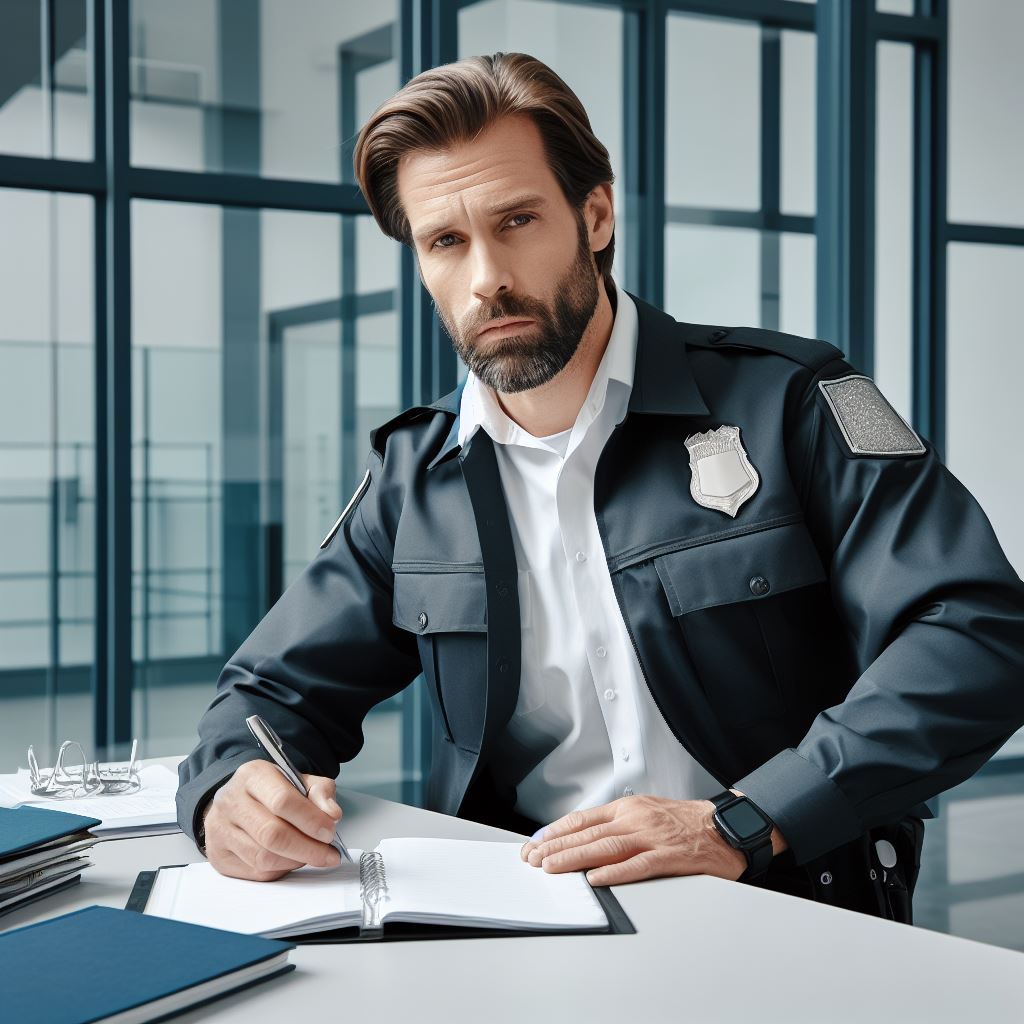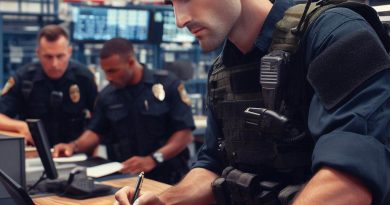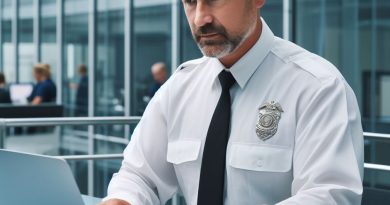Impact of COVID-19 on Security Guard Services in the United States
Last Updated on January 27, 2024
Introduction
A. Overview of COVID-19
COVID-19, a global pandemic, disrupted lives worldwide, altering norms and industries. Its impact on security guard services in the United States is profound.
B. Significance of Security Guard Services
Security guards are the frontline protectors of businesses and communities, ensuring safety and order.
Their role became even more critical during the pandemic, guarding against new threats.
C. Purpose of the Blog Post
This blog post aims to dissect the far-reaching effects of COVID-19 on security guard services in the United States.
We’ll explore the challenges, adaptations, and evolving roles within the industry, shedding light on the resilience and adaptability of security professionals in these unprecedented times.
Pre-COVID-19 State of Security Guard Services in the United States
A. The role of security guard services in various sectors
- Security guard services play a crucial role in safeguarding people, assets, and properties.
- They are employed in a wide range of sectors, including residential, commercial, industrial, and healthcare.
- Security guards patrol premises, monitor surveillance systems, and enforce regulations to prevent unauthorized access.
- In residential settings, they ensure the safety of residents and their properties, responding to emergencies and addressing any security concerns.
- In commercial and industrial sectors, security guards protect company assets, prevent theft, and maintain order.
- Healthcare facilities require security guards to ensure the safety of patients, staff, and sensitive information.
B. Current trends and challenges faced by security guard services
- One of the current trends in the security guard industry is the increased demand for armed security guards.
- Due to growing concerns over workplace violence and terrorism, armed guards provide an added layer of protection.
- Another challenge faced by security guard services is the high turnover rate of guards.
- The demanding nature of the job, low wages, and limited career growth opportunities contribute to this issue.
- Moreover, security guard services often face challenges related to recruiting and training qualified personnel.
- Ensuring that guards have the necessary skills and knowledge is essential for maintaining a high level of service.
C. Impact of technological advancements on the industry
- Technological advancements have significantly impacted the security guard industry in recent years.
- CCTV cameras, access control systems, and alarm systems have improved surveillance capabilities.
- These technologies enable security guards to monitor larger areas more efficiently, reducing the need for additional personnel.
- Furthermore, mobile applications and digital reporting systems have streamlined communication and reporting processes.
- Security guards can easily document incidents and share real-time information with their team and clients.
- However, the adoption of technology also presents challenges, such as the need for continuous training to keep up with advancements.
Basically, security guard services play a vital role in various sectors, ensuring the safety and protection of people and assets.
Despite the challenges and high turnover rates, the industry continues to evolve with the help of technological advancements.
The integration of innovative surveillance systems and digital reporting tools has enhanced the efficiency and effectiveness of security guard services.
As we delve deeper into the impact of COVID-19, it is important to recognize the pre-existing strengths and challenges of the security guard industry in the United States.
Immediate Effects of COVID-19 on Security Guard Services
A. Increased demand for security guard services in essential sectors
- Healthcare facilities, grocery stores, and distribution centers requiring more security personnel.
- Protection of essential services from potential theft, vandalism, and unauthorized access.
- Securing crowded areas to enforce social distancing and prevent the spread of the virus.
The COVID-19 pandemic has had significant immediate effects on security guard services in the United States.
Essential sectors such as healthcare facilities, grocery stores, and distribution centers have experienced a surge in demand for security personnel.
These sectors require increased protection to ensure the safety of staff, products, and customers.
Security guards play a crucial role in preventing theft, vandalism, and unauthorized access to these essential services.
Furthermore, they help enforce social distancing guidelines, ensuring crowded areas are managed effectively to minimize the spread of the virus.
B. Closure/limited operations of non-essential businesses leading to reduced demand
- Many businesses, such as retail stores, restaurants, and hotels, had to close due to lockdown measures.
- Decreased foot traffic and reduced need for security services in these establishments.
- Financial strain forcing businesses to cut costs, including security guard services.
On the other hand, non-essential businesses faced closures or limited operations during the pandemic’s peak.
Retail stores, restaurants, and hotels experienced a sharp decline in customer foot traffic, resulting in reduced demand for security guard services.
With financial strain affecting businesses’ bottom line, many opted to cut costs, including security expenses.
This led to a decrease in employment opportunities for security guards in these sectors.
C. Implementation of safety protocols for security guards
- Providing personal protective equipment (PPE) such as masks, gloves, and hand sanitizers.
- Enforcing temperature checks and health screenings to ensure guards’ well-being.
- Training security personnel on new procedures to maintain a safe working environment.
- Adapting to remote monitoring techniques and minimizing physical contact with others.
Simultaneously, the implementation of safety protocols became crucial for security guards during the pandemic.
Employers prioritized the well-being of their guards by providing them with personal protective equipment (PPE), including masks, gloves, and hand sanitizers.
Temperature checks and health screenings were also employed to ensure that guards were not unknowingly spreading the virus.
Adapting training programs, security personnel learn new procedures for a safe working environment—conducting socially distant patrols and minimizing physical contact.
Additionally, technology such as remote monitoring techniques played a vital role in minimizing on-site presence and reducing potential exposure.
Overall, the immediate effects of COVID-19 on security guard services have been mixed, with increased demand in essential sectors but reduced demand in non-essential businesses.
The implementation of safety protocols has become a necessary precaution to safeguard the well-being of security guards and those they protect.
These changes have forced the security industry to adapt quickly to the evolving circumstances presented by the pandemic.
Read: Veterans Transitioning to Security Roles: A Guide for the U.S. Market

Shifts in Security Guard Services During the
A. Adaptation to remote work and use of technology
Security guard services in the United States have undergone significant shifts in response to the COVID-19 pandemic.
One notable change has been the adaptation to remote work and the increased reliance on technology.
As social distancing measures were enforced and many businesses closed their doors, security guard companies had to find alternative ways to carry out their duties.
Remote work became the norm for security guard supervisors and managers who were responsible for overseeing operations.
With the help of advanced technology, security guards were able to remotely monitor surveillance cameras and control access to premises.
This allowed them to maintain a level of security without being physically present at the location.
Additionally, the use of virtual patrols became increasingly popular, where security guards would monitor properties through live video feeds.
This not only ensured the safety of the premises but also reduced the risk of exposure to the virus for both the guards and the individuals being monitored.
B. Focus on enforcing COVID-19 protocols and regulations
Another shift in security guard services during the pandemic was the increased focus on enforcing COVID-19 protocols and regulations.
As essential workers, security guards played a vital role in ensuring compliance with safety measures.
Security guards were responsible for monitoring the number of individuals entering a facility, ensuring social distancing guidelines were followed, and enforcing the use of personal protective equipment such as masks.
They were also in charge of conducting temperature checks and ensuring that only authorized personnel were allowed entry.
Their role expanded beyond traditional security tasks to include educating employees and visitors about the importance of adhering to COVID-19 protocols.
By enforcing these regulations, security guards helped prevent the spread of the virus and protected the health and well-being of all individuals on the premises.
C. Changes in roles and responsibilities of security guards
The pandemic brought about significant changes in the roles and responsibilities of security guards.
Beyond their usual duties, security guards became ambassadors of public health and safety.
In addition to enforcing COVID-19 protocols, security guards were responsible for managing crowd control in establishments that were allowed to remain open.
They ensured that social distancing guidelines were followed during peak hours and that overcrowding did not occur.
Furthermore, security guards took on the role of providing guidance and support to individuals who were experiencing anxiety or uncertainty due to the pandemic.
They became a source of reassurance and comfort during a time of heightened fear and stress.
Moreover, security guards worked closely with local law enforcement agencies and healthcare professionals to implement emergency response plans specific to the pandemic.
They received training on proper infection control measures and became an integral part of emergency preparedness protocols.
Essentially, the COVID-19 pandemic has brought about significant shifts in security guard services in the United States.
Adaptation to remote work and the use of technology, a focus on enforcing COVID-19 protocols, and changes in roles and responsibilities have all been prominent during this time.
Security guards have played a crucial role in maintaining public health and safety while ensuring the continuation of essential services.
Read: Physical Fitness Standards and Tips for U.S. Security Guards
Financial Implications for Security Guard Service Providers
The COVID-19 pandemic has had a profound impact on various industries, including security guard services in the United States.
In this section, we will discuss the financial implications that security guard service providers have faced as a result of the pandemic.
A. Loss of revenue due to business closures
Many security guard service providers have experienced a significant loss of revenue as businesses temporarily closed or scaled back their operations due to the pandemic.
One of the major financial implications for security guard service providers during the COVID-19 pandemic has been the loss of revenue.
Many businesses were forced to close or reduce their operations to comply with government regulations and prevent the spread of the virus.
As a result, security guard contracts were canceled or suspended, leading to a significant decrease in income for service providers.
B. Increased costs for ensuring the safety of security guards
Security guard service providers have faced additional expenses in implementing safety measures such as providing personal protective equipment and sanitization supplies.
Another financial challenge for security guard service providers has been the increased costs associated with ensuring the safety and well-being of their guards.
To protect against COVID-19, service providers have had to invest in personal protective equipment (PPE) such as masks, gloves, and hand sanitizers.
Additionally, regular sanitization of equipment and workspaces has become necessary, adding to the operational costs.
C. Government support and initiatives to alleviate financial burden
The government has recognized the financial struggles faced by security guard service providers and has initiated support programs and initiatives to help alleviate their burden.
The government has recognized the financial hardships faced by security guard service providers and has implemented several support measures.
These include providing financial assistance through grants and loans to eligible businesses.
Additionally, some government initiatives have focused on subsidizing the costs of PPE and sanitization supplies for service providers, relieving them of some of the financial burden.
Generally, the COVID-19 pandemic has had significant financial implications for security guard service providers in the United States.
Business closures have resulted in a loss of revenue, while the need to ensure the safety of security guards has led to increased costs.
However, government support and initiatives have aimed to alleviate the financial burden and help service providers navigate through these challenging times.
Read: Networking Opportunities for Security Professionals in the USA
Long-Term Impact and Future Outlook for Security Guard Services
A. Anticipated Changes in the Industry Post-Pandemic
- Increased demand for security guard services as businesses prioritize safety and protection.
- Integration of advanced technology such as AI surveillance systems for enhanced security measures.
- Implementation of stricter protocols and training to mitigate future health crises.
- Shift towards remote monitoring and virtual security solutions to reduce physical contact.
- Growing focus on cybersecurity to combat increased digital threats and risks.
B. Importance of Security Guard Services in the Recovery Process
- Security guard services play a vital role in maintaining public order and ensuring safety during recovery.
- Proactive measures taken by security guards can prevent breaches and effectively manage potential risks.
- The presence of security guards instills confidence in consumers, encouraging them to return to establishments.
- Security guards provide support to healthcare facilities by enforcing COVID-19 safety protocols.
- Ensuring compliance with safety guidelines helps prevent the resurgence of the virus and contributes to economic recovery.
C. Opportunities for Growth and Improvements in the Sector
- The security guard industry could witness an increased demand for specialized services such as temperature screening.
- Collaboration between security companies and healthcare institutions to develop innovative safety solutions.
- Investments in training programs to equip security guards with the necessary skills to handle evolving security threats.
- Integration of data analytics to improve operational efficiency and optimize resource allocation.
- Development of sustainable and environmentally friendly security practices to align with changing societal values.
To sum it up, the COVID-19 pandemic has had a profound impact on security guard services in the United States.
Anticipated changes in the industry include increased demand for services, integration of advanced technology, and stricter protocols.
Security guard services are crucial in the recovery process as they maintain public order, prevent breaches, and instill confidence in consumers.
There are also opportunities for growth and improvements in the sector, such as specialized services, collaborations, and investments in training and technology.
The long-term outlook for security guard services remains optimistic as the industry adapts to new challenges and embraces innovation.
Read: Balancing Vigilance and Courtesy: A U.S. Security Guard Challenge
Delve into the Subject: Specialized Units: From K-9 to SWAT in the USA
Conclusion
The COVID-19 pandemic has had a significant impact on security guard services in the United States.
The demand for security guards has increased dramatically due to the need to enforce social distancing measures and ensure public safety in various settings such as hospitals, grocery stores, and public transportation.
Security guard companies face challenges providing training and protective equipment, yet they tirelessly overcome obstacles to fulfill responsibilities.
Despite the risks involved, security guards have played a crucial role in maintaining order and protecting the public during these challenging times.
To support and recognize the vital role of security guard services, it is important for both individuals and organizations to take action.
This can include following guidelines provided by security guards, respecting their authority, and expressing gratitude for their dedication and hard work.
Additionally, companies and institutions should ensure that security guard services are adequately funded and equipped to handle future emergencies.
It is also essential for policymakers to recognize the importance of security guard services and provide appropriate resources and support.
Implementing initiatives improves training, certifying processes, promoting fair compensation, benefits for security guards, and establishing clear guidelines and protocols for emergencies.
In closing, security guard services have played a critical role in maintaining public safety during the COVID-19 pandemic in the United Stat
By recognizing their significance and taking necessary actions, we can ensure that security guard services continue to be effective and contribute to a safer and more secure society.


